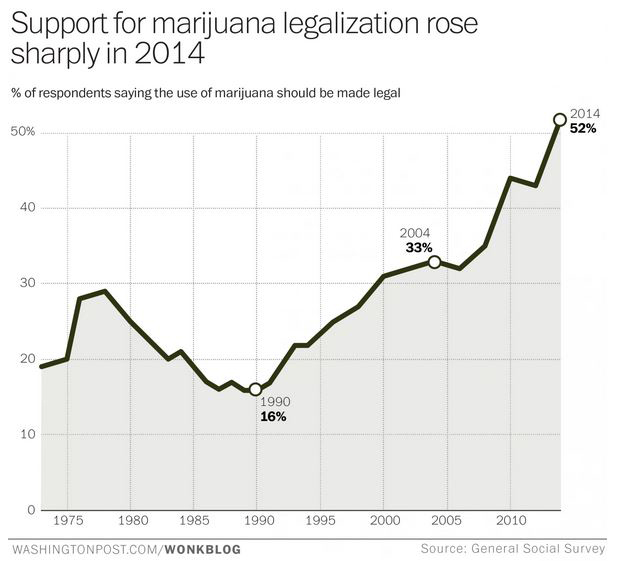Support is up 9 percentage points from 2012, the last time the General Social Survey was conducted.
For the first time, the General Social Survey — a large, national survey
— a large, national survey conducted every two years and widely considered to represent the gold
standard for public opinion research — shows a majority of
Americans favoring the legalization of marijuana.
conducted every two years and widely considered to represent the gold
standard for public opinion research — shows a majority of
Americans favoring the legalization of marijuana.In interviews conducted between March and October of last year — when the legal marijuana markets
 in Colorado and Washington were ramping up — researchers asked 1,687
respondents the following question: “Do you think the use of marijuana
should be made legal or not?”
in Colorado and Washington were ramping up — researchers asked 1,687
respondents the following question: “Do you think the use of marijuana
should be made legal or not?”Fifty-two percent said pot should be legalized, 42 percent opposed it, and another 7 percent were undecided. Support is up 9 percentage points from 2012, the last time the survey was conducted.
The GSS marijuana numbers trace the trajectory of U.S. drug policy over the past 40 years. In 1974, a year after the Shafer Commission recommended removing marijuana from Schedule 1 of the Controlled Substances Act, public support for full legalization stood at 19 percent. Support rose through the 1970s, reaching nearly 30 percent in 1978, only to plummet during the Reagan years, “Just Say No” and the advent of the drug war.
The year 1990 represented the nadir of legalization support, when it stood at 16 percent. But the numbers rose steadily through the 1990s as states began adopting medical marijuana laws, starting with California in 1996. As recently as 2006, support stood only at 32 percent — just a little bit higher than the previous peak in 1978. In the fewer than 10 years since then, support has jumped 20 percentage points — mirroring, in many ways, the dramatic shift in public opinion on gay marriage
 over the same period.
over the same period.Legalization supporters have been able to capitalize on that energy and secure
 full legalization in four states, with a partial legal status
in DC similar to the Schafer Commission’s original recommendation.
Opponents have scrambled to catch up, but the sharp and sustained
increase in public opinion means they’re facing an uphill battle. That
fact that they’ve been drastically outspent at every turn — partially a reflection of greater public support for the pro-legalization camp — hasn’t helped things.
full legalization in four states, with a partial legal status
in DC similar to the Schafer Commission’s original recommendation.
Opponents have scrambled to catch up, but the sharp and sustained
increase in public opinion means they’re facing an uphill battle. That
fact that they’ve been drastically outspent at every turn — partially a reflection of greater public support for the pro-legalization camp — hasn’t helped things.Still, after repeated losses at the ballot box legalization opponents are now turning toward the courts. The attorneys general of Nebraska and Oklahoma have filed suit against Colorado. Former DEA administrators and a DC-based tough-on-crime group advocating for harsher prison sentences have also rallied to the cause. Additional state-level lawsuits may be coming soon.
For a public increasingly weary of the toll of decades of costly and ineffective drug policies, these cases will be a tough sell. Younger Americans — including Republican ones — overwhelmingly favor marijuana legalization. And after a year of legal pot, Colorado doesn’t appear to be experiencing buyer’s remorse. A recent Quinnipiac poll found that 58 percent of Colorado’s voters said they supported the state’s marijuana law — slightly more than the 55 percent who approved it in 2012.
The strong numbers in the latest General Social Survey
 indicate that
the issue isn’t losing salience with the public. At the national level,
support for legal marijuana remains robust — and doesn’t show signs of
wavering any time soon.
indicate that
the issue isn’t losing salience with the public. At the national level,
support for legal marijuana remains robust — and doesn’t show signs of
wavering any time soon.

No comments:
Post a Comment